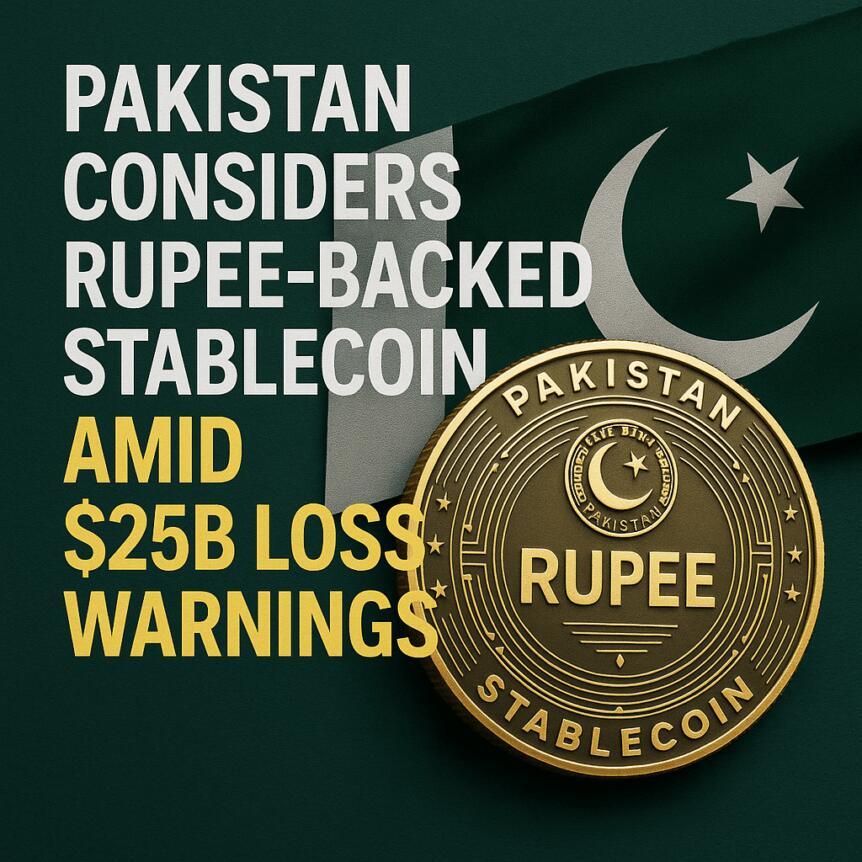
Pakistan Considers Rupee-Backed Stablecoin Amid $25B Loss Warnings
- Pakistan considers launching a rupee-backed stablecoin to unlock billions in crypto-driven growth. The central bank is developing a CBDC, supported by the World Bank and IMF, with a pilot phase imminent. Fintech startup ZAR raises nearly $13 million to expand stablecoin access among Pakistan's unbanked population. Pakistan's crypto market ranks third globally, highlighting rapid adoption and market potential. The country invites international crypto firms to obtain licenses under new regulatory frameworks.
Pakistan is making strides toward integrating digital currencies into its financial system, aiming to harness the benefits of blockchain technology for economic growth. The country's financial regulators are strongly considering the launch of a rupee-backed stablecoin, a move that could tap into an estimated $20–$25 billion in digital asset opportunities. This initiative comes as local industry leaders emphasize the need for robust regulation to prevent missing out on the booming global stablecoin and DeFi markets.
At a recent conference organized by the Sustainable Development Policy Institute (SDPI), Zafar Masud, President of the Pakistan Banks Association, highlighted that the global stablecoin ecosystem is rapidly expanding. He said Pakistan is“seriously considering a rupee-backed stablecoin,” which could facilitate easier cross-border remittances and extend financial inclusion. Faisal Mazhar, Deputy Director of Payments at the State Bank of Pakistan, revealed that a Central Bank Digital Currency (CBDC) prototype is already underway with technical assistance from the World Bank and IMF, with a pilot planned before full deployment.
ZAR's Stablecoin Commitments to Financial InclusionPakistan's ambition to embrace stablecoins builds on the recent success of ZAR, a fintech startup dedicated to providing dollar-backed stablecoins to unbanked and underbanked populations. Having recently raised $12.9 million in funding led by Andreessen Horowitz, ZAR aims to bridge Pakistan's significant financial exclusion gap through accessible digital assets. With over 100 million adults in Pakistan remaining unbanked, such initiatives could significantly enhance financial inclusion and economic participation.
Cointelegraph reports that Pakistan has climbed to third place globally in the Chainalysis 2025 Global Crypto Adoption Index, reflecting the country's rapid uptake of cryptocurrency and blockchain solutions. This momentum further underscores the market's potential for development and investment.
Pakistan ranks third in global crypto adoption. Source: Bilal Bin SaqibPakistan Launches Licensing for Crypto FirmsAs part of its efforts to foster a regulated digital asset environment, Pakistan opened its markets to international crypto exchanges earlier this year. The Pakistan Virtual Asset Regulatory Authority (PVARA), established under the Virtual Assets Ordinance 2025, issued invitations to global firms to apply for licenses. PVARA's roles encompass licensing, supervising, and regulating virtual asset service providers (VASPs), signaling the country's commitment to integrating cryptocurrency into its financial ecosystem responsibly.
This regulatory push aims to attract reputable international players and ensure that Pakistan's crypto sector develops within a framework that emphasizes security and transparency, ultimately bolstering investor confidence and safeguarding user interests in the evolving blockchain landscape.
Crypto Investing Risk Warning
Crypto assets are highly volatile. Your capital is at risk. Don't invest unless you're prepared to lose all the money you invest.
Legal Disclaimer:
MENAFN provides the
information “as is” without warranty of any kind. We do not accept
any responsibility or liability for the accuracy, content, images,
videos, licenses, completeness, legality, or reliability of the information
contained in this article. If you have any complaints or copyright
issues related to this article, kindly contact the provider above.


















Comments
No comment